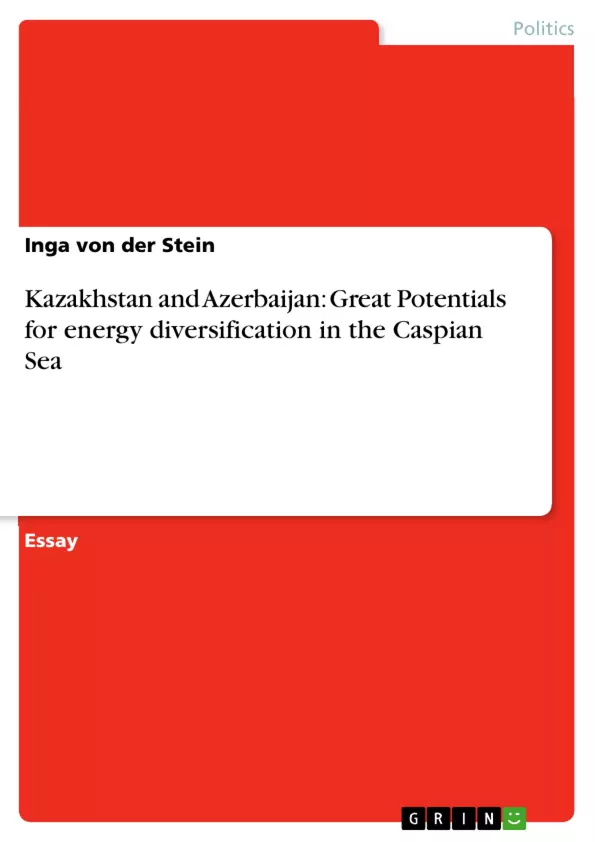This paper argues that Azerbaijan strength is its key geostrategic position, while Kazakhstan’s strength is its abundance of energy resources. However the heavy dependence on the energy sector makes both countries victims to fluctuating oil and gas prices. While Azerbaijan is reluctant to reform, Kazakhstan is more concrete in increasing the amount of renewables in its energy industry and more ambitious in adapting its tariffs to the decreasing oil prices on the world market. Thus, it is possible that Kazakhstan will attract more investment and growth in the long-run.
This paper is structured as follows: firstly, a background outlines the historical development of the Caspian Sea region. Secondly, a theoretical part discusses the approach used to analyse Azerbaijan and Kazakhstan, outlining the factors identified by IEA. Thirdly, in an analytical part, the theoretical framework by the IEA is applied to both countries.
Inhaltsverzeichnis (Table of Contents)
- INTRODUCTION
- BACKGROUND
- THEORY
- ANALYSIS
- General Energy Policy
Zielsetzung und Themenschwerpunkte (Objectives and Key Themes)
This paper aims to provide a comprehensive energy policy review of Azerbaijan and Kazakhstan, focusing on their potential for energy diversification in the Caspian Sea region. The analysis utilizes the framework of the International Energy Agency (IEA), which emphasizes five key factors: General Energy Policy, Energy Security, Market Convergence, Sustainable Development, and Investment Attraction.
- The strategic importance of the Caspian Sea region for global energy security.
- The role of Azerbaijan and Kazakhstan as key energy producers in the region.
- The challenges and opportunities for energy diversification in the Caspian Sea region.
- The potential impact of fluctuating oil and gas prices on the economies of Azerbaijan and Kazakhstan.
- The strengths and weaknesses of the energy policies of Azerbaijan and Kazakhstan.
Zusammenfassung der Kapitel (Chapter Summaries)
- INTRODUCTION: This chapter introduces the Caspian Sea region as a strategically important area for global energy security, highlighting Azerbaijan and Kazakhstan as major oil and gas producers. The paper outlines its purpose, which is to evaluate the future potential of these countries for energy diversification, based on the IEA's framework of five key factors.
- BACKGROUND: This chapter presents the historical context of the Caspian Sea region, tracing its oil production history and the impact of the Soviet Union's dissolution on the newly independent states. It discusses the challenges faced by these states, including territorial disputes and security concerns, and highlights the role of international oil companies in exploiting the region's energy resources.
- THEORY: This chapter outlines the theoretical framework employed in the paper, drawing upon the IEA's approach to analyze energy policies in the Black Sea and Caspian Sea region. It explains the four pillars of the INOGATE program, which form the basis for the IEA's analysis, and introduces the five key factors considered in the paper: General Energy Policy, Energy Security, Market Convergence, Sustainable Development, and Investment Climate.
- ANALYSIS - General Energy Policy: This chapter begins the analysis of the energy policies of Azerbaijan and Kazakhstan, focusing on their respective general energy policies. It highlights the historical development of Azerbaijan's energy policy, emphasizing the importance of the "contract of the century" with British Petroleum and its impact on the country's economic growth. The chapter also discusses the role of the EU in Azerbaijan's energy policy and the importance of the Southern Gas Corridor. For Kazakhstan, the chapter emphasizes its unique position in Central Asia, its role as a major oil producer, and the importance of the Kashagan field. It further discusses the country's economic growth, vulnerability to commodity price fluctuations, and the challenges associated with low productivity and competitiveness in sectors beyond energy.
Schlüsselwörter (Keywords)
The primary keywords and focus topics of this text include: Caspian Sea region, energy diversification, Azerbaijan, Kazakhstan, International Energy Agency (IEA), energy security, market convergence, sustainable development, investment climate, oil and gas production, economic growth, commodity prices, Southern Gas Corridor, Kashagan field, energy policy review.
Frequently Asked Questions
What are the main energy strengths of Azerbaijan and Kazakhstan?
Azerbaijan's primary strength lies in its strategic geostructural position, while Kazakhstan is characterized by its vast abundance of energy resources.
Which framework is used to analyze the energy policies in this paper?
The analysis utilizes the framework provided by the International Energy Agency (IEA), which focuses on five key factors: General Energy Policy, Energy Security, Market Convergence, Sustainable Development, and Investment Attraction.
How do the two countries differ in their approach to renewable energy?
Kazakhstan is more concrete in increasing the share of renewables in its energy industry and more ambitious in adapting its tariffs compared to Azerbaijan, which appears more reluctant to reform.
What is the "contract of the century" mentioned in the text?
It refers to a landmark agreement between Azerbaijan and British Petroleum (BP) that significantly impacted the country's economic growth and energy policy development.
What are the common challenges for both Azerbaijan and Kazakhstan?
Both countries suffer from a heavy dependence on the energy sector, making their economies vulnerable to fluctuating global oil and gas prices.
What is the significance of the Southern Gas Corridor?
The Southern Gas Corridor is a critical component of Azerbaijan's energy policy and its relationship with the EU, aimed at enhancing regional energy security.
- Arbeit zitieren
- Inga von der Stein (Autor:in), 2017, Kazakhstan and Azerbaijan: Great Potentials for energy diversification in the Caspian Sea, München, GRIN Verlag, https://www.grin.com/document/435461



